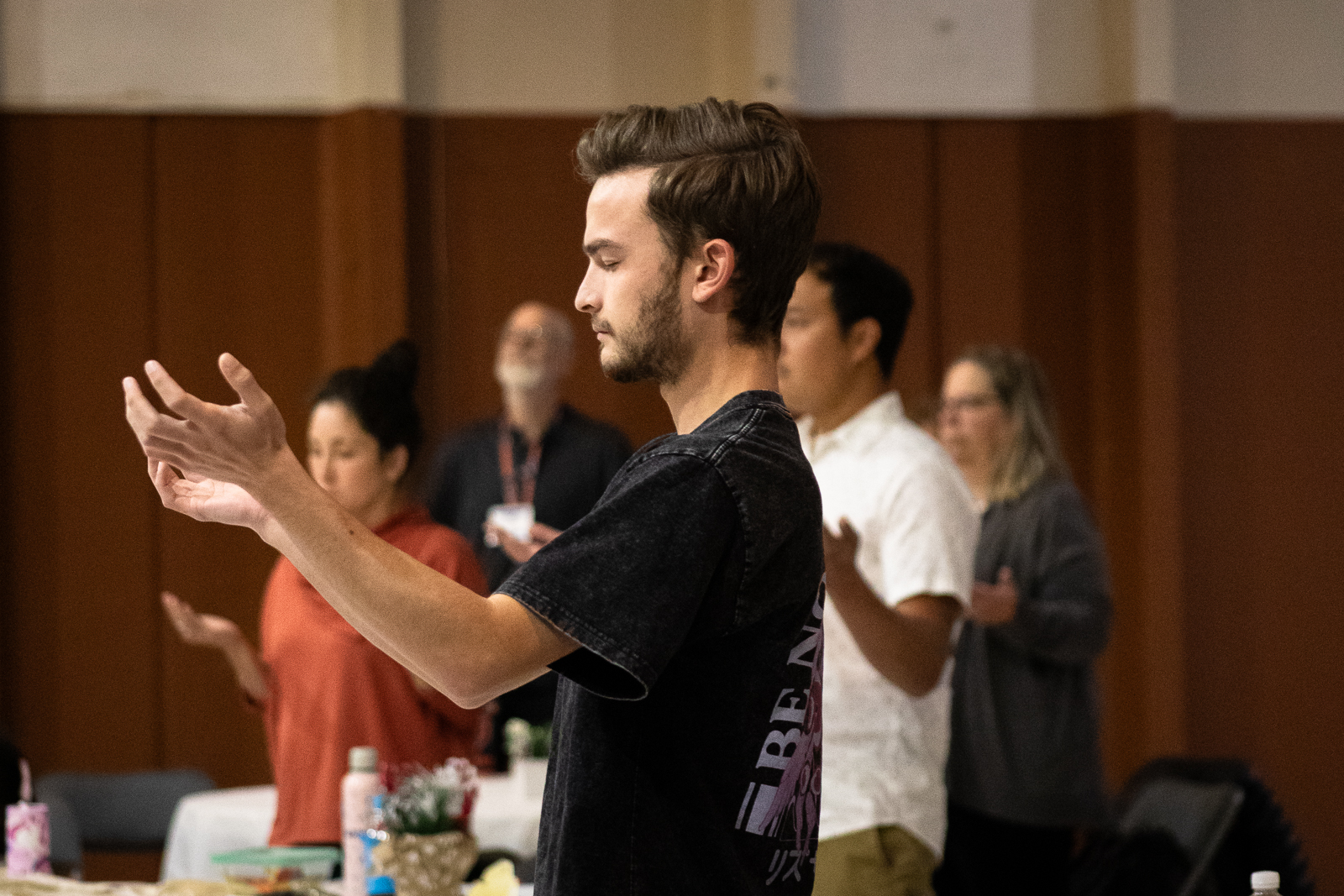About Us
As a church community, we believe that when Cloud & Bridge, God & Community, intersect, our lives and world changes. These changes are initiated through 2 essential truths exemplified by Jesus.
1. Jesus reveals to us that we don't have to be right to be loved. God pursues, loves, and accepts us as we are, not as we could be, or even should be—messiness and all.
2. Jesus also shows us that others don't have to be right to be loved. God empowers us to unconditionally pursue, love, and accept others, especially if they are not like us or don't like us.
Thus, when you attend Cloud & Bridge, you will find a community that is diverse, friendly, loving, and warm. Broken people, redeemed by Jesus, empowered by the Spirit, to share the healing that has been afforded us.
In a divided world, we believe that Jesus’ healing act, is the path to harmony with God and unity with one another.

Our Values
Our values spring forth from the last words Jesus spoke to his disciples as He ascended, “be my witnesses in Jerusalem and all Judea and Samaria, and to the end of the earth.” (Acts 1:8)

Love
Through the Great Commission, Jesus is calling us to a transformative love. A love that changes us. A love that challenges our comfort and compels us to engage and invest in people that are different than us. Through these interactions we are able to identify the image of God in others and be vessels of His transformative touch.

Discipleship
Discipleship is an act of love. Discipleship is an act of presence.
We, at Cloud & Bridge, believe that we are called to be “testifiers” of the grace and mercy of Jesus to all humankind. This testimony is long-term and is materialized through life-long fellowship, friendship, and connection.

Worship
“Be my witnesses” Jesus proclaimed. We at Cloud & Bridge embrace the truth that worship is not just relegated to the songs we sing, but most importantly, to the lives we live. We have been commissioned by Jesus to engage our communities with a grace that surpasses understanding. This engagement allows others to garner a glimpse of our Savior, hopefully drawing closer to Him in the process.

Mission
“in Jerusalem and all Judea and Samaria, and to the end of the earth.” To Jesus, mission is not entirely insular nor is it entirely global. Mission is holistic. It begins locally, and as grace allows, extends to where the Lord permits. We, at Cloud & Bridge, are intentional about first fostering community locally while actively surrendering to the Spirit to discern where He would want us to reach next.

Community
As Jerusalem, Judea, Samaria, and the end of the earth intersect, we are privileged to see how God reshapes our understanding of community. God’s community is comprised of people who are from every nation, from all tribes and peoples and languages (Rev. 7:9). God’s community is not homogenous. Thus, we embrace the diversity He has designed as it displays the complexity of His person and the beauty of His people.
Our Beliefs
These are the cornerstones from which our faith have been built.
The Trinity
We believe in the only true and living God, Father, Son, and Holy Spirit; who is holy love, eternal, unchangeable in being, wisdom, power, holiness, justice, goodness, and truth. The Holy Trinity speaks through the holy scriptures, the events of nature and history, apostles, prophets, evangelists, pastors, teachers, but uniquely in Jesus Christ, the Word made flesh.
The Bible
God’s words and actions in creation, providence, judgment, and redemption are witnessed by the covenant community in the scriptures of the Old and New Testaments. God inspired persons of the covenant community to write the scriptures. In and through the scriptures God speaks about creation, sin, judgment, salvation, the church and the growth of believers. The scriptures are the infallible rule of faith and practice, the authoritative guide for Christian living.
Jesus the Christ
God’s mighty act of reconciling love was accomplished in Jesus Christ, the divine Son who became flesh to be the means by which the sins of the world are forgiven. Jesus Christ, being truly human and truly divine, was tempted in every respect as every person is, yet he did not sin. While fully sharing human life, Christ continued to be holy, blameless, undefiled, and throughly fitted to be savior of the world, the only hope of reconciliation between God and sinful persons. Jesus willingly suffered sin and death for every person. On the third day after being crucified, Christ was raised from dead, appeared to many disciples, afterward ascended to God, and makes intercession for all persons.
The Holy Spirit
God acted redemptively in Jesus Christ because of the sins of the world and continues with the same intent in the Holy Spirit to call every person to repentance and faith. The Holy Spirit works through the scriptures, the sacraments, the corporate worship of the covenant community, the witness of believers in word and deed, and in ways beyond human understanding. The Spirit moves on the hearts of sinners, convincing them of their sins and their need for salvation, and inclining them to repentance and faith toward God.
Salvation
Saving faith is a response to God, prompted by the Holy Spirit, wherein persons rely solely upon God’s grace in Jesus Christ for salvation. Such faith includes trust in the truthfulness of God’s promises in the scriptures, sorrow for sin, and determination to serve God and neighbor. Persons do not merit salvation because of faith, nor is faith a good work. Faith is a gift made possible through God’s love and initiative. Yet God requires the response of faith by all who receive salvation and reconciliation. When persons repent of sin and in faith embrace God’s salvation, they receive forgiveness for their sin and experience acceptance as God’s children.
The Church
The church, as the covenant community of believers who are redeemed, includes all people in all ages, past, present, and future, who respond in faith to God’s covenant of grace, and all who are unable to respond, for reasons known to God, but who are saved by his grace. Because the church in the world consists of persons who are imperfect in knowledge and in the power to do God’s will, she waits with eager longing for the full redemption of the family of God. Until that time God wills that all believers worship and witness through the church in the world and promises to guide her life and growth through the Holy Spirit. The church in the world never exists for herself alone, but to glorify God and work for reconciliation through Christ. Christ claims the church and gives her the word and sacraments in order to bring grace and judgment to persons.
Sacraments
Sacraments are signs and testimonies of God’s covenant of grace. Circumcision and passover are the sacraments of the Old Testament; baptism and the Lord’s Supper are the sacraments of the New Testament. They are given by God and through his presence, word, and will are made effective.
Baptism
Baptism symbolizes the baptism of the Holy Spirit and is the external sign of the covenant which marks membership in the community of faith. In this sacrament the church bears witness to God’s initiative to claim persons in Christ, forgive their sins, grant them grace, shape and order their lives through the work of the Holy Spirit, and set them apart for service.
Communion
The Lord’s Supper was instituted by Jesus Christ on the night of his betrayal. It is a means by which the church remembers and shows forth Christ’s passion and death on the cross. The sacrament is also a perpetual means given to the church to celebrate and experience the continuing presence of the risen Lord and her expectation of the Lord’s return. The elements used in this sacrament are bread and the fruit of the vine, which represent the body and blood of Christ. The elements themselves are never to be worshipped, for they are never anything other than bread and the fruit of the vine. However, because the sacrament represents the Savior’s passion and death, it should not be received without due self-examination, reverence, humility, and grateful awareness of Christ’s presence.



